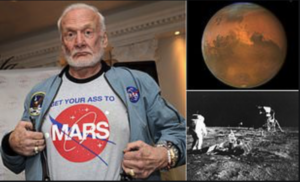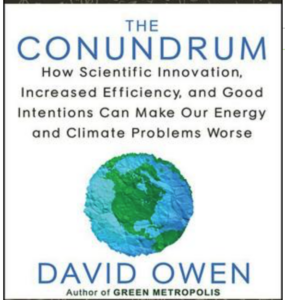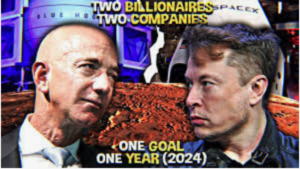Buzz Aldrin: “You Promised Me Mars Colonies.
Instead, I Got Facebook” … and a Movie!
“You Promised Me Mars Colonies,” blasted legendary astronaut Buzz Aldrin on the cover of the MIT Technology Review. “Instead, I Got Facebook!” And there, folks, you have the anti-Big Tech argument in a nutshell, succinctly put by the Review’s Editor-in-Chief Jason Pontin in his provocative and timeless article, “Why We Can’t Solve Big Problems.”

Why? Best answer: Because America no longer thinks long-term, no longer invests big in “Big Problems,” like landing a man on the moon in the sixties. Silicon Valley, and the rest of America’s top innovative technology geniuses, focus on “little problems,” short-term billionaire-makers like Facebook and friends, Twitter, Linkedin, Snapchat and Instagram. Even the Bezos-Musk race to build Mars colonies for a few million humans is at best another escapist distraction from focusing on the truly “Big Problems” facing the billions who’ll be left behind on our rapidly overcrowding planet.
Back in 1972 Pontin was just five as Apollo 17 lifted off: “My mother admonished me not to stare at the fiery exhaust of the Saturn 5 rocket. I vaguely knew that this was the last of the moon missions — but I was absolutely certain that there would be Mars colonies in my lifetime. What happened?”

Yes, what did happen? Why did America fail Buzz Aldrin? Fail Silicon Valley? Fail America’s next generation facing climate disasters? Fail to keep Kennedy’s vision alive: Why is America failing as the world’s technology leader? What happened to our vision?
What Happened To The Future? Billionaires Lost in Megalomania!
“That something happened to humanity’s capacity to solve big problems is a commonplace,” says Pontin. “There is a paucity of real innovations. Instead, they worry, technologists have diverted us and enriched themselves with trivial toys.”
Guys like PayPal co-founder Peter Thiel are echoing Aldrin: “We wanted flying cars — instead we got 140 characters.” Pontin even says “Thiel is caustic,” he doesn’t even “consider the iPhone a technological breakthrough compared to the Apollo program.” The Internet is “a net plus — but not a big one.” And yes, Twitter is “job security for the next decade,” for 500 people. But Thiel, one of the best thinkers in the Valley, asks the big question: “What value does it create for the entire economy?”
Apparently not much to Silicon Valley critics: “We should be aiming higher.” From the Founders Fund manifesto, “What Happened to the Future?” They companies and toward companies that solved incremental problems or even fake problems.” Instead of being a “funder of the future,” Silicon Valley had “become a funder of features, widgets, irrelevances.”
Silicon Valley Created Its Own “Big Problems” Roadblock!
The criticisms are misleading, says Pontin: “The argument that venture capitalists lost their appetite for risky but potentially important technologies clarifies what’s wrong with venture capital and tells us why half of all funds have provided flat or negative returns for the last decade.”
But “even during the years when VCs were most risk-happy, they preferred investments that required little capital and offered an exit within eight to 10 years.” Truth is, “VCs have never funded the development of technologies that are meant to solve big problems,” says Pontin, in a direct challenge to Silicon Valley’s so-called ‘Big Problems’ syndrome.

And that forces him back to the core question raised by Buzz Aldrin, Peter Thiel and every high-tech investor more interested in quarterly profits and big quick payoffs: “Putting aside the personal-computer revolution, if we once did big things but do so no longer, then what changed?” Pontin does a brilliant job diagnosing five key Big Problem macro-trends:
1. Far Bigger Public Priorities, Like Climate Survival!
Seriously, is Silicon Valley’s ‘Big Problem’ a real problem? Or did their high-tech geniuses make it up? Pontin says “sometimes we choose not to solve big technological problems. We could travel to Mars if we wished. NASA has the outline of a plan,” and “if the agency received more money … humans could walk warn that “venture investing shifted away from funding transformational on the Red Planet sometime in the 2030s.” But “we won’t, because there are, everyone feels, more useful things to do on Earth.” Indeed, efforts by Elon Musk and Jeff Bezos can’t outrun Earth’s ticking population clock.
2. Economic Costs Force Huge Constraints on Technologies
Energy is a real Big Problem with real cost issues: “Less than 2% of the world’s energy consumption was derived from advanced renewable sources such as wind, solar and biofuels.” Still, “coal and natural gas are cheaper than solar and wind … petroleum is cheaper than biofuels.” Another: Yes, climate change is a real Big Problem. But because the main cause of global warming is carbon dioxide released as a by-product of burning fossil fuels, we need renewable energy technologies that can compete on price with coal, natural gas and petroleum. At the moment, they don’t exist.” Yet Bill Gates still presses for an “energy miracle” that seems as far away as the black holes in Avatar and Interstellar.
3. Political Ideologies Block Timely Action … Till Too Late
Yes, “economists, technologists and business leaders agree on what national policies and international treaties would spur the development and broad use of such alternatives,” says Pontin. But without agreement on how “to share the risks of development, alternative energy sources will continue to have little impact on energy use, given that any new technology will be more expensive at first than fossil fuels.” Worse, there’s “no hope of any U.S. energy policy or international treaties” given conservative opposition to regulations and because developing markets like China and India will not reduce their emissions without offsetting reductions by our developed nations.
4. Big Problems Mis-Diagnosed … They’re Not “Technology!”
Most Big Problems aren’t technology problems, “or could more plausibly be solved through other means.” We used to believe famines were problems in food supply, etc. But Nobel laureate economist, Amartya Sen proved that “famines are political crises that catastrophically affect food distribution.”

Pontin warns: The hope for technological solutions is “very seductive — so much so that disappointment with technology is inevitable.” Malaria resists technology solutions. “The most efficient solutions are simple: eliminating standing water, draining swamps, providing mosquito nets and, most of all, increasing prosperity.” But that didn’t stop Bill Gates and other technologists from searching for “ingenious solutions … But they all suffer from the vanity of trying to impose a technological solution on what is a problem of poverty.”
5. “Big Problems” Often So Complex, Nobody Can Solve Them!
Finally, warns Pontin, “sometimes big problems elude any solution because we don’t really understand the problem.” Get it? Us humans are the real “Big Problem!” Early in the 1970s biotechnology breakthroughs flowed. Later breakthroughs were tougher. We just don’t “understand the fundamental biology of many diseases.” In 1971 Nixon declared a war on cancer, “but we soon discovered there were many kinds of cancer” that resist treatment. Gene sequencing is now helping us understand the different cancers and “how their mutations express themselves in different patients.”

Another big one: As nations age, the “dementia plague” is becoming “the world’s most pressing health problem. By 2050, palliative care in the United States alone will cost $1 trillion a year. Yet we understand almost nothing about dementia and have no effective treatments.” And we’ve been fighting a war on drugs for decades and it just gets worse.
Are Mars Colonies Just a “Big Distraction?” Why?
Big Tech Has No Solutions to America’s Real “Big Problems!”
In the end, Pontin is realistic: “It’s not true that we can’t solve big problems through technology; we can,” he admits. “But all these elements must be present: political leaders and the public must care to solve a problem, our institutions must support its solution, it must really be a technological problem, and we must understand it. The Apollo program, which has become a metaphor for technology’s capacity to solve big problems, met these criteria, but it is an irreproducible model for the future. This is not 1961.”

Bottom line, Jason Pontin’s full article, “Why We Can’t Solve Big Problems” in MIT Technology Review is a harsh picture of tech insiders. But it is also a must-read for Wall Street and Main Street investors looking for hi-tech investments. He challenges and analyzes the ‘Big Problems’ raised by astronaut Buzz Aldrin and Silicon Valley’s best and brightest minds. It’s guaranteed to get you thinking about the role of technology in America’s future as a superpower that will succeed in saving the world … from itself.













